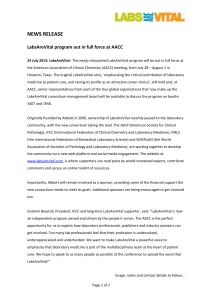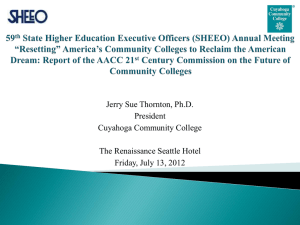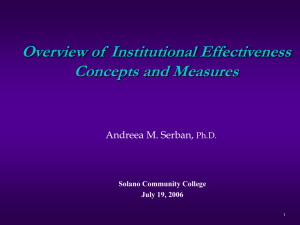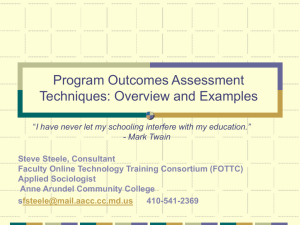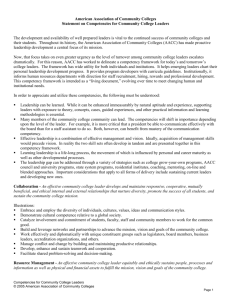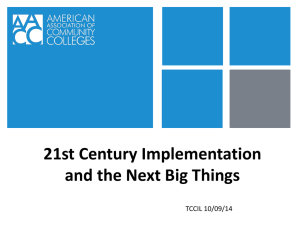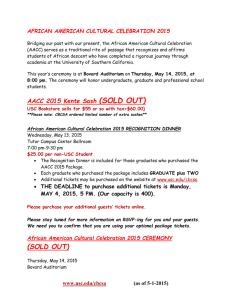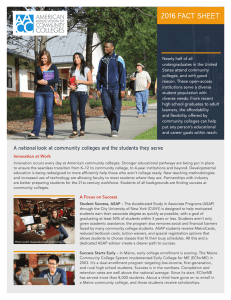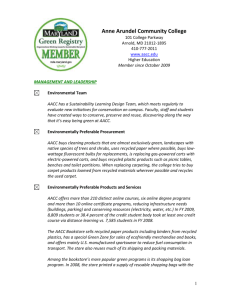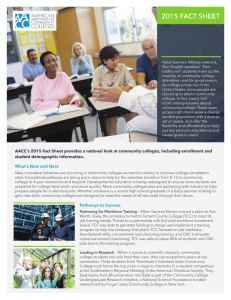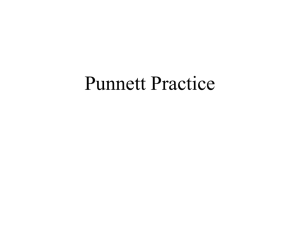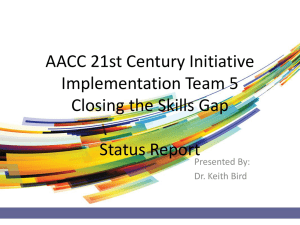State Director`s Meeting - National Council of State Directors of
advertisement
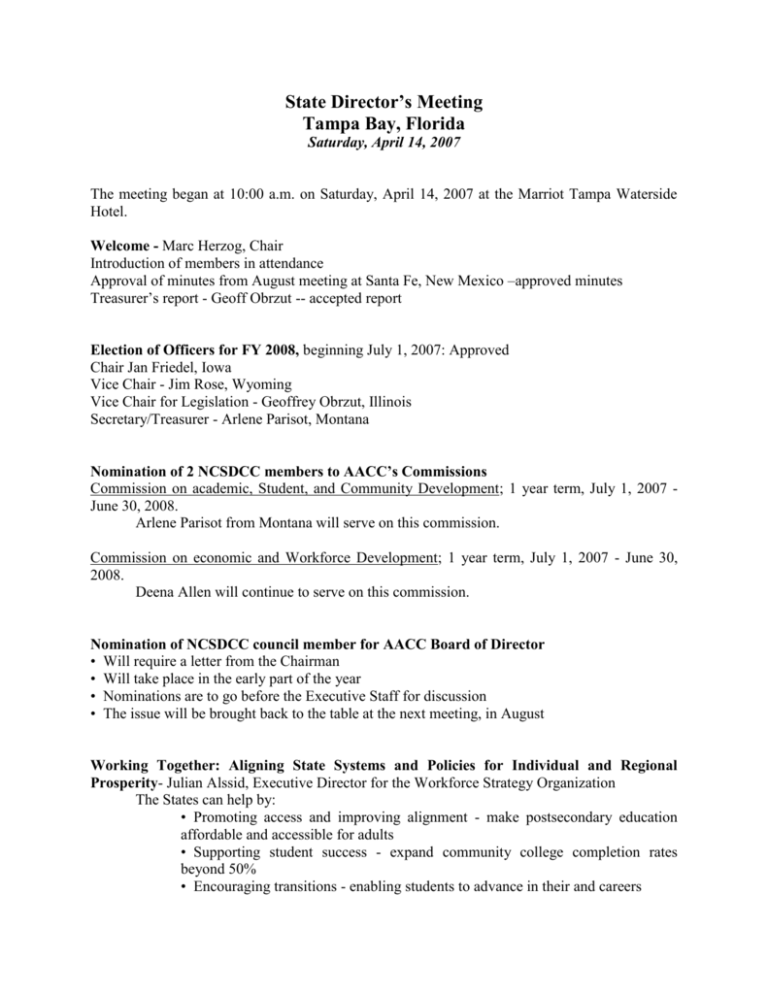
State Director’s Meeting Tampa Bay, Florida Saturday, April 14, 2007 The meeting began at 10:00 a.m. on Saturday, April 14, 2007 at the Marriot Tampa Waterside Hotel. Welcome - Marc Herzog, Chair Introduction of members in attendance Approval of minutes from August meeting at Santa Fe, New Mexico –approved minutes Treasurer’s report - Geoff Obrzut -- accepted report Election of Officers for FY 2008, beginning July 1, 2007: Approved Chair Jan Friedel, Iowa Vice Chair - Jim Rose, Wyoming Vice Chair for Legislation - Geoffrey Obrzut, Illinois Secretary/Treasurer - Arlene Parisot, Montana Nomination of 2 NCSDCC members to AACC’s Commissions Commission on academic, Student, and Community Development; 1 year term, July 1, 2007 June 30, 2008. Arlene Parisot from Montana will serve on this commission. Commission on economic and Workforce Development; 1 year term, July 1, 2007 - June 30, 2008. Deena Allen will continue to serve on this commission. Nomination of NCSDCC council member for AACC Board of Director • Will require a letter from the Chairman • Will take place in the early part of the year • Nominations are to go before the Executive Staff for discussion • The issue will be brought back to the table at the next meeting, in August Working Together: Aligning State Systems and Policies for Individual and Regional Prosperity- Julian Alssid, Executive Director for the Workforce Strategy Organization The States can help by: • Promoting access and improving alignment - make postsecondary education affordable and accessible for adults • Supporting student success - expand community college completion rates beyond 50% • Encouraging transitions - enabling students to advance in their and careers • Incorporating employer demand and economic development - connecting states’ economic development and workforce resources • Priorities, build capacity and finance improvement - Allocating resources to improve institutions and providers • Measuring results - tracking student education and employment outcomes The White Paper has been posted on the web: www.workforcestrategy.org Summer meeting August 5-8, 2007, Williamsburg, VA Dr. Glenn DuBois handed out packets of information to each state. One of the events on the agenda will be taking a tour of a naval ship at the Newport News Shipyard located in Virginia. Dr. DuBois will also be inviting guest speakers, one of which will hopefully include someone from Virginia Tech University. The hotel reserved for the meeting is the Marriot Williamsburg. Future Meeting Sites It has been approved that the 2008 State Director’s Meeting will be held in Chicago, Illinois, hosted by Geoffrey Obrzut, and the 2009 meeting will be held in Little Rock, Arkansas, hosted by Ed Franklin. AACC Commission on Academic, Student and Community Affairs - Arlene Parisot, MT Two major issues: • National Science Foundation • Advanced Technology Education Center • Concern about viability of technical programs • Drop in enrollments • Competition with transfer programs There will be a Focus Group Discussion on Sunday at 11:15 in Room 24 held in the Convention Center. The discussion topics: • Trends for technical programs in your state • Challenges and solutions • Who are the stakeholders? AACC Commission on Economic and Workforce Development - Deena Allen, MN (See Summary of Commission on Economic and Workforce Development meeting) Licensure Committee, Nursing - Issues having to do with nursing is this committee’s primary goal. The AACC is proposing that a study be conducted by the Institute of Medicine to document the impact of associate degree trained RNs, but substantial funds are needed (about $1 million) to conduct the study. The commission on Economic and Workforce Development proposes the following actions be submitted to the Licensure Committee for refinement and forwarding to the AACC Board of Directors. 1. AACC encourages that AD RN Nursing programs obtain NLN (National League for Nursing) accreditation. Commission members supported this recommendation with a split vote. The majority of bachelor’s RN programs meet national accreditation standards. 2. AACC encourages community and technical colleges to work with hospitals and with the organizations/employers to become allies in developing a plan to address the nursing shortage through associate degree RN programs. 3. AACC staff will facilitate the development of a one page marketing document to convey the attributes of AD RN programs including measures such as; • pass rates on board exams • articulation and transfer rates • job placement rates • accreditation information The commission leadership asked that the community college state director’s group to discuss the accreditation issue. As a point of information, it was noted that North Carolina and South Carolina are requiring that all two year college nursing programs receive national programmatic accreditation. Skills Gap and a Workforce Agenda for the CC Caucus - Jim Hermes discussed the status of WIA reauthorization and HEA. Most of the time was spent on WIA and suggested changes to the proposed legislation. Mr. Hermes indicated that the Community College Caucus continues to grow. If your representatives have not signed on, please discuss this with them. Suggestions offered for changes in WIA include: • Address the immigration issue • Move community colleges more to the center of legislation • Build more bridges and alignment between adult basic education and post secondary education Defense Contracting – There was not much time for discussion. However the following points were made by Carol Spalding, Chair and President of Florida Community College/JacksonvilleOpen Campus. Carol’s institution has a significant grant to provide training to the military. • Because of the war, the military is cutting back on training • Military is putting pressure on enlisted service men to get a BS degree • There is a significant amount of money available for training • The current focus of the army’s training is on the use of untethered devices such as IPODS and cell phones in the training process Perkins legislation – Jim McKenney reported that the AACC is considering recommending that Tech Prep funding remain separate in each state under the Perkins legislation. The entire new Perkins law is focused on the principles of Tech Prep which is high school to college transitions and articulated CTE programs. So, maintaining a separate Tech Prep fund seems inconsistent with the intent of the legislation and not logical in terms of the implementation strategy. AACC Report – Dr. George Boggs, President Dr. Boggs touched on a few points during his report: Corporate America initiative was made to encourage corporations to engage in conversations with the community college leaders concerning issues of interest. There needs to be expansion on the transferring opportunities for community college students to more of the universities and colleges in the US. The Coffman Foundation was set up to encourage funding entrepreneurial programs at community colleges. There is a PBS documentary “Learning Matters, Discounted Dreams” currently out that is about the community college system. Current research has shown that 50% of people who earn baccalaureate degrees take courses at the community colleges. If they start at the community college level, it is just as likely that they will earn baccalaureate degree; it might take a little longer. The AACC wants to promote global education, study abroad programs, and encouraging student exchanges. The latest on the student loan scandal, which is putting student lenders on preferred provider lists, has not uncovered any problems at the community college level so far. The AACC will provide guidelines on ethics and financial aid to presidents. New presidents need to be encouraged to maintain college membership in AACC. US Department of Education Report - Pat Stanley, Deputy Assistant Secretary, Office of Vocational and Adult Education Starting May 24 -25, will be the Data Quality Institute in Savannah, Georgia. This institute needs the community college representation. The Community College Virtual Summit will be held on June 28, 2007 at the Reagan Center in Washington, D.C. The NCSDCC members list has been circulated to the OVAE staff so that they can refer their state questions to the appropriate state director. Most states have submitted a transitional plan for Perkins. Technical skills assessment is difficult; however, OVAE will provide technical assistance. The members today need to start planning the next two years for the community colleges. Communities of Learners need to be brought together to discuss community college issues and provide follow-up papers and reports. There will be a survey submitted, “Issues that Matter”, with this material. 2007 Futures Policy Commission Critical Issues Report - Dale Campbell, Professor and Director, Community College Leadership Consortium & Futures Assembly, University of Florida See report: Declining by Degrees: Higher Education at Risk, Campbell, Basham, O’Daniels and Berry The most critical issues facing the community colleges are: • remediation/underpreparedness • funding resources and shortages • return on investment • alignment K-12 and higher education • finding and keeping faculty with current skills Next year, the senior writer of Change or Die will hopefully be a keynote speaker. It is a book on how to change individuals and organizations. Mr. Campbell recommended, for the council’s consideration, to give Ray Young the National Leadership Award. 50 State Survey of Community Colleges - Terry Tollefson, Professor and Interim Chair, Department of Educational Leadership, East Tennessee State University Tollefson reported there are 16 state chapters that have been submitted. There is a common format that will be sent out. A designate authorship also needs to be specified. In the past 30-35 authored by state directors of community colleges or designees; others were created from secondary sources. Legislative Update, David Baime, Laurie Quarles, Jim Hermes, AACC For the first time this year there are no earmarks and no unclaimed pots of money available. This year we lost Flo Guyer to retirement. There has not been a replacement at this time to provide support to NCSDCC; however, Jim Hermes will provide administrative support. The Hope scholarships and Lifetime learning credit offer community college students with the opportunity for significant benefits. They are non tuition expenses, so the students will be able to put the expenses into tax credit, which will make the credit refundable. This affects low income taxpayers. They are looking at an extension for the Reauthorization of the Higher Education Act. The Academic Competitiveness grants program and merit grants are not working. The funds should be put into other financial aid. Dismal participation is restricted to full time students. This next year looks to be in good position to see increase in funding for higher education. An increase in the Pell grant this year and we should go back to 2002 funding levels. Within the welfare reform area, rules promulgated by HHS are very restrictive (TANF grants). HHS is reviewing state plans, head counts on an hourly basis (but will not include online courses), class attendance on daily basis, and monitored study halls are a requirement for counting preparation toward participation time. A list of questions that need to be asked of financial aid officers will be distributed to the community colleges soon. Negotiated Rule Making Committee on Accreditation - Chancellor James McCormick, MN James McCormick represents SHEEO on the Department of Education’s Negotiated Rule Making Committee on Accreditation. The final three day meeting is scheduled for next week. The accreditors will be pushed to develop criteria, standards, and benchmarks. There is no one specifically representing community colleges on the commission. National accreditors represented on commission are supportive of requiring criteria and standards and benchmarks. Regional accreditors seem to not agree on proposed alternative language. Instead they seem to want to implement whatever the Department of Education implements. Summit on Higher Education - Marc Herzog, Department of Education The agenda is complimentary to community colleges. There will be outside consultants to facilitate, and the suggested topics are agreed to ahead of time; however, some topics might be off the table. There will be five regional summits to gain broader input. Members are encouraged to participate. AACC Accountability Task Force - Marc Herzog The community colleges seem more receptive to needs for accountability. The ability to collect, analyze, and publish data is going smoother. On Monday afternoon, there will be an AACC session on accountability with Jan Friedel, Martin Lancaster and a representative from Florida. Closing Statements and Adjournment The next meeting will be held at Williamsburg, VA, by Dr. Glenn DuBois on August 5-8, 2007. Chairman Herzog encouraged his fellow directors to attend. Thanks to Dr. DuBois and his staff for all their efforts. Adjournment approved.
